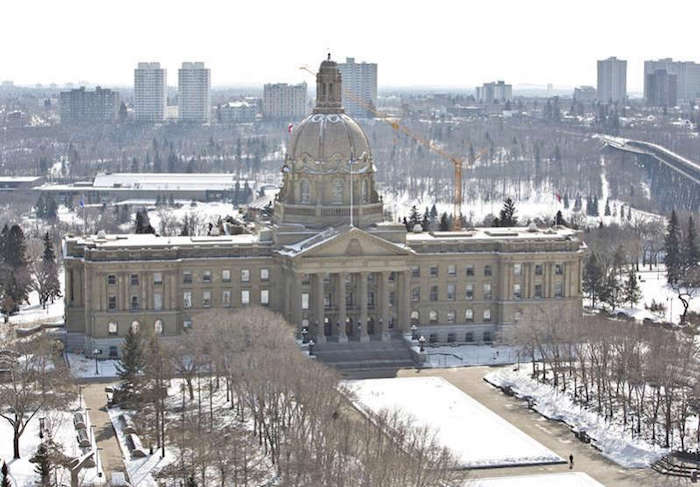Alberta
Alberta going after entrepreneurs and immigrants working as health-care professionals

Improving the Alberta Advantage Immigration Program
Changes to the Alberta Advantage Immigration Program (AAIP) will make it easier for in-demand workers and entrepreneurs to become permanent residents.
Alberta’s economy has momentum, and Alberta’s government is committed to further growth and diversification so the province remains the economic engine of Canada. In 2022, nearly 50,000 people from around the world chose Alberta as the place to invest, work and raise their families.
AAIP is an economic immigration program that enables Alberta to nominate qualified workers in in-demand sectors for permanent residency. By improving the program, Alberta will be more competitive in attracting skilled newcomers from across the world.
“Alberta is a land of opportunity. In our province, you can find the career you want, take home a strong and regular paycheque, and still spend time with family and friends. Not only do people around the world want to come here, we want them to come here to be a part of our communities and our prosperity, and help Alberta continue to grow and succeed.”
Alberta’s government is making five improvements to the AAIP that will help both businesses and international skilled workers.
Changes to the Rural Entrepreneur and Rural Renewal streams will help Alberta’s rural communities remain vibrant and grow. A lowered investment threshold of $100,000 for the Rural Entrepreneur Stream will will open the door to additional qualified entrepreneurs who wish to establish or purchase an existing business in participating rural Alberta communities. Removing the requirement for a letter from a settlement agency under the Rural Renewal Stream will help rural communities attract, recruit and welcome newcomers based on local needs.
“Bringing more workers needed in the province will be key to continuing to grow Alberta’s economy and meeting our labour shortages. These changes to AAIP show our commitment to making Alberta one of the best places in the world to put down roots, contribute positively to your community and be prosperous.”
Alberta has the best front-line health care workers in the world and the province will work to have the right supports in place to ensure Albertans get the care they need when and where they need it. A new, dedicated pathway to attract medical professionals to Alberta means that up to 30 per cent of Alberta’s Express Entry Stream allocation in 2023 will be reserved for health-care professionals with an Alberta job offer from a health-care sector employer and who meet the requirements to work in one of the eligible health occupations.
Two more changes will see a new phone line that directly connects AAIP staff members with clients and collaboration with the federal Economic Mobility Pathways Pilot. Participating in this pilot will help refugees with the skills and qualifications needed in Canada to immigrate through existing economic programs.
“These policy changes are aimed squarely at filling needed skills gaps, boosting vibrancy in rural communities, and creating more economic opportunity for refugees. We applaud these moves to enhance economic immigration in a way that is responsive to specific provincial needs.”
“From HV Global Immigration, we would like to thank Minister Rajan Sawhney for listening and proactively implementing reasonable changes to the AAIP. Apart from the other improvements, change in minimum investment at AAIP’s Rural Entrepreneur Stream would definitely help new and prospective immigrants to qualify for this program. This change will generate more revenue and create jobs for Albertans. Last, but not least, the new information phone line is going to be a big relief. Thanks once again Minister Sawhney for your hard work and listening to our ideas and solutions.”
Quick facts
- Alberta currently has about 100,000 job openings across the province.
- Alberta is forecasting a cumulative job shortage of 33,100 workers by 2025 across several occupations, skill levels and sectors (source: Alberta’s Occupational Outlook, 2021-2030).
- Immigration, Refugees and Citizenship Canada sets AAIP’s annual nomination limits.
- Alberta recently received an increase in nominations:
- 9,750 nominations in 2023
- 10,140 nominations in 2024 (estimated)
- 10,849 nominations in 2025 estimated)
- Alberta recently received an increase in nominations:
Alberta
Former senior financial advisor charged with embezzling millions from Red Deer area residents

News release from Alberta RCMP
Former senior financial advisor charged for misappropriating nearly $5 million from clients
On April 4, 2024, the RCMP’s Provincial Financial Crime Team charged a Calgary resident for fraud-related offences after embezzling millions of dollars from his clients while serving as a senior financial advisor.
Following a thorough investigation, the accused is alleged to have fraudulently withdrawn funds from client accounts and deposited them into bank accounts he personally controlled. A total of sixteen victims were identified in the Red Deer area and suffered a combined loss of nearly $5 million.
Marc St. Pierre, 52, a resident of Calgary, was arrested and charged with:
- Fraud over $5,000 contrary to section 380(1)(a) of the Criminal Code; and,
- Theft over $5,000 contrary to section 344(a) of the Criminal Code.
St. Pierre is scheduled to appear in Red Deer Provincial Court on May 14, 2024.
“The ability for financial advisors to leverage their position to conduct frauds and investment scams represents a significant risk to the integrity of Alberta’s financial institutions. The investigation serves as an important reminder for all banking clients to regularly check their accounts for any suspicious activity and to report it to their bank’s fraud prevention team.”
- Sgt. John Lamming, Provincial Financial Crime Team
The Provincial Financial Crime Team is a specialized unit that conducts investigations relating to multi-jurisdictional serious fraud, investments scams and corruption.
Alberta
Political parties will be part of municipal elections in Edmonton and Calgary pilot projects

Strengthening Alberta’s local elections
Alberta’s government is introducing legislation to ensure Albertans can rely on transparent, free and fair elections, and municipally-elected officials have clearer accountability measures.
In a democratic society, Albertans expect their local elections to be free and fair, and their elected officials to be held to account by clear rules that govern their local councils. The Municipal Affairs Statutes Amendment Act proposes amendments to the Local Authorities Election Act (LAEA) and the Municipal Government Act (MGA) to add greater transparency to local election processes and ensure local councils and elected officials continue to remain accountable to the citizens who elected them.
“Our government is committed to strengthening Albertans’ trust in their local governments and the democratic process that elects local leaders. The changes we are making increase transparency for Alberta voters and provide surety their votes will be counted accurately. We know how important local democracy is to Albertans, and we will work with local authorities to protect and enhance the integrity of local elections.”
Local Authorities Election Act
Albertans expect free and fair elections and that’s why it’s important we strengthen the rules that govern local elections. To strengthen public trust in local elections, Alberta’s government will eliminate the use of electronic tabulators and other automated voting machines. All Albertans should be able to trust the methods and results of local elections; requiring all ballots to be counted by hand, clarifying rules and streamlining processes for scrutineers will provide voters greater assurance in the integrity of the results.
All eligible Albertans should be able to vote in local elections without impediment. Alberta’s government will limit the barriers for eligible voters to cast a ballot by expanding the use of special ballots. Currently, special ballots can only be requested for very specific reasons, including physical disability, absence from the municipality, or for municipal election workers. By expanding the use of special ballots, the government is encouraging more voter participation.
Amendments in the Municipal Affairs Statutes Amendment Act would increase transparency in local elections by enabling political parties at the local level. Political parties would be enabled in a pilot project for Edmonton and Calgary. The act will not require candidates to join a political party in order to run for a local or municipal office, but will create the opportunity to do so.
In addition, proposed changes to the Local Authorities Election Act would allow municipalities the option to require criminal record checks for local candidates, thus increasing transparency and trust in candidates who may go on to become elected officials.
Municipal Government Act
The role of an elected official is one with tremendous responsibility and expectations. Changes proposed to the Municipal Government Act (MGA) will strengthen the accountability of locally elected officials and councils. These include requiring mandatory orientation training for councillors, allowing elected officials to recuse themselves for real or perceived conflicts of interest without third-party review and requiring a councillor’s seat to become vacant upon disqualification.
If passed, the Municipal Affairs Statutes Amendment Act will also unlock new tools to build affordable and attainable housing across Alberta. Proposed amendments under the MGA would also create more options for municipalities to accelerate housing developments in their communities. Options include:
- Exempting non-profit, subsidized affordable housing from both municipal and education property taxes;
- Requiring municipalities to offer digital participation for public hearings about planning and development, and restricting municipalities from holding extra public hearings that are not already required by legislation; and
- Enabling municipalities to offer multi-year residential property tax exemptions.
Municipal Affairs will engage municipalities and other partners over the coming months to hear perspectives and gather feedback to help develop regulations.
Quick facts
- The LAEA establishes the framework for the conduct of elections in Alberta municipalities, school divisions, irrigation districts and Metis Settlements.
- The MGA establishes the rules governing the conduct of local elected officials once on council, as well as the overall administration and operation of municipal authorities in Alberta, including any policy those authorities may wish to implement.
Related information
-

 COVID-192 days ago
COVID-192 days agoPfizer reportedly withheld presence of cancer-linked DNA in COVID jabs from FDA, Health Canada
-

 COVID-191 day ago
COVID-191 day agoTrudeau gov’t has paid out over $500k to employees denied COVID vaccine mandate exemptions
-

 National2 days ago
National2 days agoAnger towards Trudeau government reaches new high among Canadians: poll
-

 Automotive5 hours ago
Automotive5 hours agoThe EV ‘Bloodbath’ Arrives Early
-

 Addictions1 day ago
Addictions1 day agoWhy can’t we just say no?
-

 International1 day ago
International1 day agoRFK Jr tells EWTN: Politicization of the CIA, FBI, Secret Service under Biden is ‘very troubling’
-

 Brownstone Institute2 days ago
Brownstone Institute2 days agoThe Teams Are Set for World War III
-

 Opinion2 days ago
Opinion2 days agoThe Climate-Alarmist Movement Has A Big PR Problem On Its Hands








